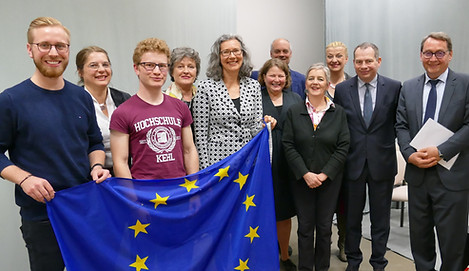
26th February 2021:
Local Communities
Online Workshop of the
Jean Monet Chair EUKom
Takers and Shapers of the EU Decision Making Process
The event will be kicked off by a quick introduction by Prof. Dr. Joachim Beck, rector of the Kehl University.
Prof. Dr. Eppler will present her research on the EU Multi- Level System and the role of local communities
and the guidingquestions of the workshop.
The main guiding questions for the online Workshop include:
-
What position do municipalities have in the respective national system?
-
What role do municipalities play in the implementation of legislation initiated by the European level?
-
What changes result for municipalities from their integration into the EU system?
-
Do municipalities set up their own EU departments and, if so, where in the municipal administration?
-
Do municipalities become active in EU affairs on their own initiative?
-
Do municipalities raise EU funds and if so, in which areas?
-
Do municipalities maintain (joint) offices in Brussels in order to exert influence?
-
What possibilities do municipalities have nationally to influence the EU policy of the member state?
-
How do municipalities network with each other (across national borders)?
20th September 2019:
3rd Jean Monnet Seminar
Grenzüberschreitende Zusammenarbeit nach
dem Aachener Vertrag
Territoriale Entwicklungssteuerung im Kontext
rechtlich-institutioneller Flexibilisierung
Coopération transfrontalière après le Traité d'Aix-la-Chapelle
Gestion du développement territorial dans un contexte
de flexibilisation institutionnelle et juridique
Centre d'excellence Jean Monnet Franco-Allemand, Hochschule Kehl
16th May 2019:
Yours is my Heart - Europe
Theater play & panel discussion

Prof. Dr. Beck, rector of the university welcomed the numerous spectators, including many interested students and citizens of Kehl. Prof. Dr. Eppler introduced the event with thoughts on the upcoming election of the European Parliament and described its importance in the context of the development of the European Union. Then she welcomed the actors and left the stage to them
In the following play "Dein ist mein Herz - Europa" ("Yours is my heart - Europe") by the ensemble "Dein Theater" from Stuttgart, the tyrant king's daughter Europa, after whom the continent is named, takes the floor herself. The multilingual mother of three sons comments on current political debates with female intelligence, humor and foresight. Kalliope, the muse of science, philosophy and string playing, also gets her turn, presenting the musical diversity of a unique continent in a mashup of various languages.
The subsequent panel discussion, moderated by Dr. Eppler, between Prof. Dr. Larat from the École Nationale d'Administration Strasbourg, Dr. Zoller, Ministry of Justice and Europe Baden-Württemberg, Felix Kolb from the political department of the university and Uwe Fromm for the JEF Kehl was focused in particular on the following questions: Why is the 2019 European election of great importance to us? Why should we vote? The future of Europe and the growing importance of the Parliament were also topics of discussion.
Annually
Worshop Migration and Integration
jointly with the Academy of the Diocese Rottenburg-Stuttgart
organized by Prof. Dr. Eppler, Prof. Dr. Frey, Prof. Dr. Pattar
25th October 2018
Jean Monnet Kick-Off
Inaugural Lecture and Panel Discussion
A lecture by Dr. Eppler followed by a discussion round heralded the award of the Jean Monnet Chair to her at the University of Public Administration in Kehl.
Prof. Dr. Witt, then rector of the university, acknowledged in his welcome to the audience the importance of the chair for the research location at the German-French border.
The following lecture by Dr. Eppler, who was awarded the Jean Monnet Chair in 2018, was also her inaugural lecture at Kehler University. Previously, Eppler conducted research in Insbruck, among other places, where she also completed her habilitation. In her lecture, she described the rule of law mechanisms of the EU and the development of an EU multi-level rule of law system.
She also spoke about the role of the municipal level in this system. She also critically examined the developments in individual member states that are scaling back their rule of law systems and the measures taken by the EU to protect the rule of law system.
This was followed by a panel discussion on the topic of future challenges facing the EU. Participating in this were:
Prof. Dr. Andreas Maurer (University of Innsbruck), Prof. Dr. Oliver Schlumberger (University of Tübingen), Dr. Doris Dialer
(then Head of Office in the European Parliament ), the Vice President of the European Parliament, Rainer Wieland MEP, as well as Prof. Dr. Annegret Eppler and Prof. Dr. Andreas Pattar (University of Kehl).
The audience - about 350 interested listeners from the Kehler students, civil society as well as EU experts from Kehl and Strasbourg listened intently and had the opportunity to ask questions afterwards. Thus, they were also able to participate in the discussion.
The discussions continued afterwards at a champagne reception in the foyer of the university.
Jean Monnet Chair
at the University of Applied Sciences Kehl


Welcome to the Jean Monnet Chair on European Integration Studies at the University of Applied Sciences Kehl.
The Jean Monnet programme stimulates teaching, research and reflection on European integration at higher education institutions worldwide. With generous funding from the European Commission, we carry out and supervise EU-related research, teaching, and outreach.
The Jean Monnet Chair for EU integration studies at the University of Applied Sciences Kehl was first awarded in 2018 to Professor Dr. habil. Annegret Eppler for the project "Local Communities in the European Union" (LoComEU)". In 2022, she was again awarded a Jean Monnet Chair on "Public Administrations in the EU multi-level system (ELEMENT)".
Jean Monnet Chairs are awarded to qualified professors specializing in European integration studies. In addition to teaching on EU-related topics, a Jean Monnet Chair also includes research and public events on EU issues. The Chairs are given by the European Commission, Executive Agency for Education, Audiovisual and Culture (EACEA), after a competitive selection process.






